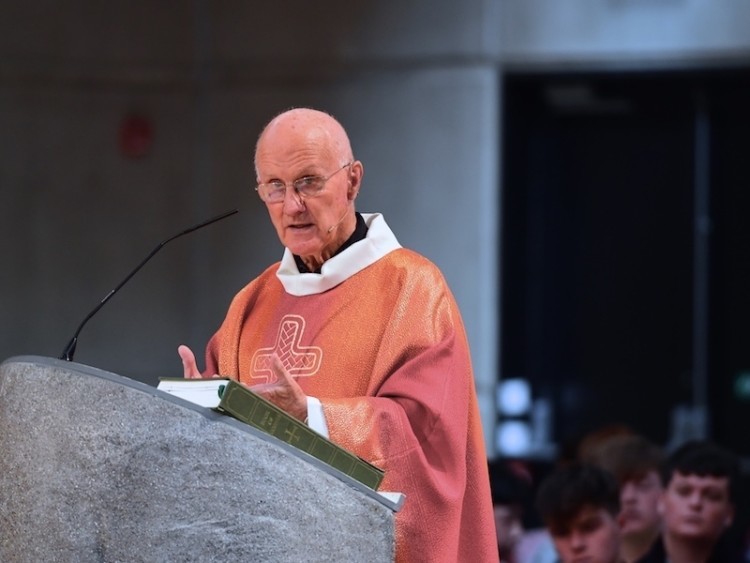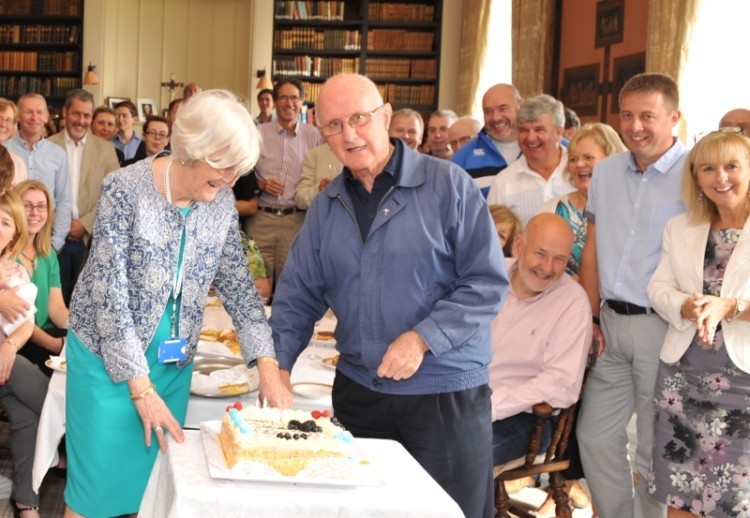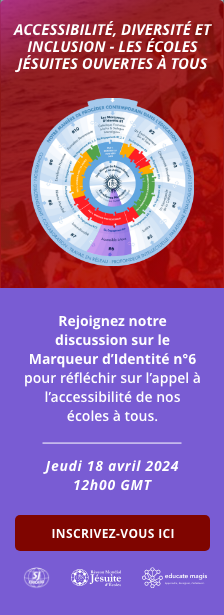Fr Michael Sheil sj, who graduated from Clongowes Wood College in 1956 has been a Jesuit for 62 years and is currently Rector of the Jesuit Community and Spiritual Father to first and second year boys. Michael is reflecting on the First Characteristic of Jesuit Education: Searching for Truth – and Finding God…
Finding God in all things – it’s in the here and now! When we were young Jesuits we entertained utopian views of what we would do for Christ on the mission fields. But what about here, with your family, your school, your community? I have always struggled with theory: I am more of an active person. I find it easier to do the thing, rather than develop a theory.
When I think of finding God in all things, I like to turn the notion around, and think that God finds me in whatever it is I do, whether I’m talking to the little fellows, or having the craic with the sixth years. I have had very different roles here: for eighteen years I was the Higher Line Prefect[1], so I was like the chief gaoler; and then I had suddenly to change into a sort of Red Coat in Butlin’s Holiday Camp! I help now with games, with some co-curricular activities and with some prefecting.
And in doing what we are doing, it’s important to remember the search for excellence. Some people misinterpret this – it is an aim, not a claim. We attempt to achieve excellence, and the effort is on going, every day, no matter what a boy’s level or standard. Clongowes Wood College is good at bringing people on: a ‘D’ student can become a ‘C’ student. In rugby no one is written off.
Sense of companionship
I think that being in a boarding school is a great advantage because it enables us to give an example of how we live these things. Companionship is what lasts and really influences the boys, and sometimes it is in the ‘down’ time, when things are not organised, that they really get to make friends. That sense of companionship is present in the other schools, too. When I was chaplain in Belvedere I remember a fellow saying to me that he never went to bed in bad form on a Sunday night because he knew he would be going into Belvedere the next day. There was a pervasive sense of community.
At the start of each year, when I’m getting to know the new students, when they chat about their families, I often ask about their Confirmation. What difference did it make to them – apart from the financial benefit? Whether it’s preparation for First Communion or for Confirmation, the schools try to do a great job – but as things are currently organised the parents are often left on the sidelines. Perhaps too much responsibility is handed over to the schools. The current changes in patronage of the schools may improve the situation. Parishes must try to get involved, but of course that only works if the family is already attending the parish.
The level of knowledge and exposure to faith can vary hugely: for some it’s minimal. The fellows are very honest; they’ll say that the only time they are faced with the practice of religion and the expression of their faith is in a place like this. Some time ago the Headmaster took the initiative by taking Mass to the Sports Hall. The space there can be configured easily to look like a modern church: some people did not think this was a great idea. However, it has given both boys and parents a richer experience of liturgy in a language that can be heard by the boys; but they may be held back by a lack of basic background knowledge of religion.
Spirituality within community
However, we continue and hope that something will take root. I say Mass here every morning before the bell. In a Jesuit boarding school there should always be the possibility of Mass. ‘God in all things’! We should have visible evidence of this each day here, whether Mass is well attended or not. Some will say they are not religious but that they are spiritual. I have heard it said that the spiritual is about ‘me’, whereas religion is about ‘we’. Religion is the expression of my spirituality within community. We are losing that sense of community, and this loss predates the Celtic Tiger.
For the past nine or ten years I have gone to Lesotho at Easter with a group of fifth years to work with the local community. The fellows are always struck by the sense of community and the happiness of people who, in contrast to us, have absolutely nothing. The phrase ‘men and women for others’ is one that really catches on. It sums up how we are trying to get them to engage socially. My hope is that what we do there may find a deep-rooted place in their consciousness, that later on in life it may mean something to them. When we are there, we do some reflection, and I hope that that experience helps them always to come back to the ‘here and now’, so that they ask:
How does that experience which I have just had change my life in the present?
What is it that speaks to me out of my present experience?

We are not unique in having cura personalis as a core value. What I hope is that students can see in me somebody who cares about them. Even by greeting them in the corridor I can give them a sense that they are important in my life. I’m not just looking after them but making myself available for them. Even if I have a difference of opinion with them, or a matter of discipline, I want them to see that their happiness is important to me. Afterwards, it’s important to meet with them to show that you can leave the issue behind and not let it damage your relationship.
We can look at the qualities of a graduate in relation to each characteristic. For me, the crucial question is: does it all add up to the graduate being a person of faith? That is not to say that someone cannot be a very fine person without faith, but that the marker for a complete appropriation of the characteristics is growth in their personal relationship with God.
[1] The Higher Line comprises the 5th and 6th year boys in Clongowes.
Se connecter ou Adhérer
pour créer et afficher des commentaires

